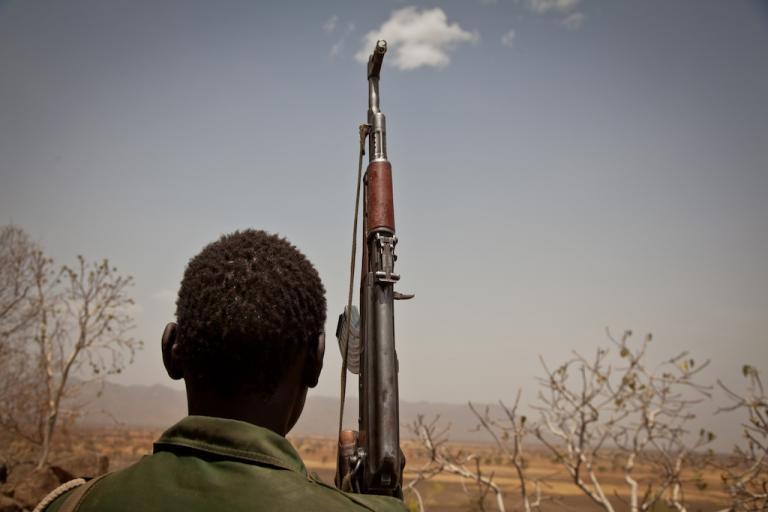Hidden war: scores killed, displaced in Sudan’s Nuba Mountains
NUBA MOUNTAINS, Sudan — Just 16-years-old, with a slight frame, Taqueen lies in the same hospital bed he has for a month, a grimy plaster cast covering his left leg from hip to toe.
In April, a Russian-made Antonov cargo plane, converted into a crude bomber by the Sudanese air force, dropped a bomb that injured the young boy.
“When I heard the Antonov engine, I tried to run,” Taqueen said. “But the bomb dropped, and the shrapnel caught me — and I fell.”
Deployed by the central government of Omar al-Bashir in the Sudanese capital, Khartoum, the Antonov bombers wreak havoc on the lives of residents of the Nuba Mountains, a rugged, hill-covered region in South Kordofan state on the border with South Sudan.
Mostly black African rebels with a mixture of Christian and traditional beliefs have fought a long series of civil wars with the Arab Islamic regimes in the capital. The International Criminal Court charged the Sudanese president with war crimes and crimes against humanity for his crackdown in west Darfur in 2008.
But the conflict here kicked off again in 2011, displacing hundreds of thousands and interrupting already meager health and education services.
Under the banner of the Sudan Revolutionary Front, rebels have recently launched successful joint offensives on towns and villages in a bid to overthrow Bashir’s government. But with an ongoing government ban on humanitarian agencies, including the United Nations, the war is being conducted almost entirely out of sight.
“People are being traumatized,” said Bishop Macram Max Gassis, who runs the Catholic Church here. “They are always looking up to the skies asking, ‘Will the plane bomb us today?’”
The Nuba Mountains' rebels — called the Sudan People’s Liberation Army-North (SPLA-North) — for years fought as part of the broader South Sudanese rebellion seeking to replace the Khartoum government with one more tolerant of Sudan’s ethnic and religious diversity, and more willing to share its oil and other resources evenly.
An internationally brokered 2005 peace deal paved the way for South Sudan’s independence — sealed in July 2011 — leaving their rebel comrades in Nuba abandoned in their quest for liberation. Weeks before South Sudan’s independence, tensions over a disputed state election in South Kordofan triggered a fresh round of fighting between SPLA-North and the regime in Khartoum.
Now, the UN says 200,000 refugees have fled the Nuba Mountains for neighboring countries — and in the last year, the refugee camp at Yida, in South Sudan, has tripled in size with displaced people from the Nuba Mountains and surrounding areas.
In the conflict zone itself, malnutrition remains a serious threat, and both schooling and health care are interrupted.
When GlobalPost visited the Nuba Mountains last year, entire villages had decamped to the caves and hills, where huge boulders and deep crevices offered protection from the bombers.
For those who stayed, almost every home, school and roadside restaurant now has a foxhole, swept and maintained just like the family kitchen or the classroom floor.
Today, only if the constant drone of the bomber’s engines becomes more high-pitched do they take cover. That sound is a sign the Antonov is climbing, and that the cargo door has been swung open to let the bombs fall out.
“The war continues and we thank God that we are alive,” said Juma Mohamed, a 39-year-old father of five, on his way home from the family sorghum field. “If there is rain, we can live.”
In the fields, farmers like Mohamed glance up at the sky as they hoe the dry soil, plant seeds, and repair the rocky terraces that will trap rainwater and stop the topsoil from washing away.
“I know Omar al-Bashir is our president, but he has come to kill his own people?” asked Father Youhanna al-Bashir, a priest at one of the region’s Catholic parishes.
“We need freedom,” he said. “We want to be like other people who are living in peace.”
Every day, reporters and producers at The World are hard at work bringing you human-centered news from across the globe. But we can’t do it without you. We need your support to ensure we can continue this work for another year.
Make a gift today, and you’ll help us unlock a matching gift of $67,000!
